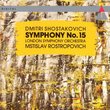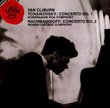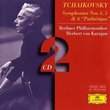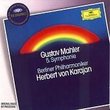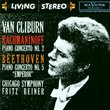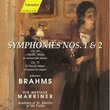| All Artists: Fromental Halevy, Anton Guadagno, Richard Tucker, Anthony Baldwin, Brian Etheridge, David Gwynne, Edgar Fleet, John Frost, John Noble, Leslie Fyson, Michele Le Bris, Robert Bickerstaff, Yasuko Hayashi Title: HalÚvy: La Juive Members Wishing: 0 Total Copies: 0 Label: Opera D'oro Original Release Date: 1/1/1973 Re-Release Date: 6/4/2002 Album Type: Live Genre: Classical Style: Opera & Classical Vocal Number of Discs: 2 SwapaCD Credits: 2 UPC: 723724368026 |
Search - Fromental Halevy, Anton Guadagno, Richard Tucker :: HalÚvy: La Juive
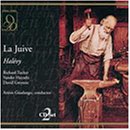 | Fromental Halevy, Anton Guadagno, Richard Tucker HalÚvy: La Juive Genre: Classical
|
Larger Image |
CD DetailsSimilarly Requested CDs |
CD ReviewsTUCKER SHINES Michel | Montreal, Quebec | 06/22/2003 (5 out of 5 stars) "La Juive is the best known work of compositor Halevy and along Meyerbeer's Les Huguenots the epitom of "French Grand Opera". This is a live concert performance from London taped in 1973. The score is heavily cut but still offers a fine representa- tion of the work. Richard Tucker - a devout jew in real life - was born to sing the role. At 60 the heroic voice is in top shape - firm and powerful - and his portrayal of Eleazar is anything if not fervent - his rendition of "Rachel quand du Seigneur" is feverish and devastatingly intense - it brings the house down. The rest of the cast is more than adequate - the two sopranos are well constrasted and sing very well - David Gwynne is a somber Cardinal and Juan Sabate copes well with the high tessitura of Leopold. The sound is not high-tech but quite good and with fine contribution from chorus and orchestra under the leadership of Anton Guadagno - this bar- gain set is highly recommandable." Tucker is wonderful in a surprisingly good opera L. E. Cantrell | Vancouver, British Columbia Canada | 06/02/2004 (5 out of 5 stars) "Source: Live 1973 performance before a well-disciplined London audience.
Performing version: Heavily cut to create a practical and performable three act opera out of the original, sprawling, grand opera in five acts. Sound: Good to very good, overall. The sound is as crisp and clean as one can reasonably hope from a live recording in 1973. Voices are generally given predominance over the orchestra. Documentation: Opera d'Oro is even worse in this set than its usual abominable standard. Neither the theater nor the orchestra is identified. The track list omits timings. No libretto. No comments on the cast except for a few words about Richard Tucker. Very limited comment on the opera and a hint about its performance history. Brief (and possibly misleading) plot summary. I have been distantly aware of the existence of an opera called "La Juive", largely because of its often recorded tenor aria, "Rachel, quand du Seigneur" and its association with the final days of the great Caruso. I also knew that it was a once popular work that had long-ago fallen out of the standard repertory. Assuming that good reason existed for its faded state, I had no particular desire to hear it until I attended a concert of operatic choral music and was impressed by a rousing chorus. "La Juive", I was surprised to find, had at least two good pieces of music in it. "The Pearl Fishers" has no more and "Lakme" does not have even that much. Some time later, while pondering over whether I (or anybody else) needed a second "Wozzeck", I stumbled on this recording and bought it out of curiosity. Listening to the opera was a series of surprises. There were not just two good pieces of music; there were a whole bunch of them, one after another. Language aside, "La Juive" did not sound at all like a French opera. Instead of the lyric and graceful wit so common to French art, it had a bumptious, Italianate muscularity. In fact, it sounded like nothing so much as early Verdi, even to the extent of using the orchestra as a sort of giant guitar. I began to wonder if its composer had ever been accused of the sin of "Verdisme"--or I did until I noticed that it dates from 1835, four years before Verdi's first opera, "Oberto" and seven years before "Nabucco". (Was Verdi ever accused of "Halevismo"?) Another surprise was the unusual casting requirements: a dramatic tenor, a high-flying lyric tenor, two sopranos and a bass. That combination is so odd for the 1830s that I can only speculate that it was created for a specific ensemble. The last surprise can be summed up in a single question. Why did this very impressive opera disappear? The plot of "La Juive" seems to have arisen out of the same gumbo of ideas that eventually led to "Il trovatore". The opera takes place in the year 1414. Some years prior to Act I, the infant daughter of a man who is now a cardinal disappeared during a siege. The opera starts with a crowd in anti-Semitic passion giving the Jewish jeweler, Eleazar, a hard time. He is saved by the cardinal, an old enemy, now in a more mellow mood. Meanwhile, Eleazar's daughter, Rachel, is being wooed by a nice, supposedly Jewish boy who just happens to a Christian prince in disguise. Prince Leopold is tomcatting around the town in anticipation of his forthcoming wedding to Princess Eudoxie. As might be expected, Rachel learns of the two-timing proclivities of the prince. She quite properly denounces the cad and, of course, finds herself arrested for feloniously allowing herself to be seduced by a Christian. The prince and old Eleazar end up in the slammer, too. Confrontations follow. The cardinal and Eleazar snarl at each other as the old jeweler throws out hints that he knows something about the whereabouts of the missing girl. Eudoxie, dismayed at the prospect of going from bride to widow with unseemly haste, faces off with Rachel. Eventually, Rachel, like Leonora in "Il trovatore", decides to sacrifice her life so that her lover might get off. Rachel's plan, unlike Leonora's, works and the utterly worthless and heartless tenor goes scot free while the innocent girl is executed, although whether by fire at the stake, as the Od'O booklet states, in boiling oil as another source reports, or in boiling water according to a third source, I cannot say. Eleazar, like Azucena, gets the last good line, for the cardinal has just executed his own daughter. Jaques Francois Fromental Halevy (1799-1862) was born as Elias Levy. He was both an academic and a practical man of the theater. He was a student of Cherubini at the Paris Conservatory, later becoming a professor there, himself. For fifteen years, while also serving as a professor of composition, he was the chorus master at the Opera. Among his students were Bizet, Gounod, Saint-Saens and Lecocq. He completed twenty-eight operas, including these intriguing titles, "Les mousquetaires de la reine", "La tempesta" and "La dame de picque". Mahler loved "La Juive" and Verdi ridiculed it. Its greatest champion--and certainly its most surprising one, considering its composer and subject--was Wagner. On this recording, Richard Tucker at age 60 is simply wonderful. There is no other word for him. The audience reaction after "Rachel, quand du Seigneur" is thunderous and absolutely deserved. This recording shows how the really great ones should finish their careers. The other tenor, Juan Sabate, is hard-edged, but he has the goods and the required high notes. He sounds just right as that unmitigated heel, Prince Leopold. The two sopranos, Yasuko Hayashi as Rachel and Michelle Le Bris as Princess Eudoxie, both sound fine, although they are sometimes difficult to tell apart. David Gwynne has a big and appropriately dark voice for Cardinal de Brogni. Update, March 2006 . . . The gentleman who writes the notes for the Od'O series has taken me to task for that wisecrack about the "Brief (and possibly misleading) plot summary." He was perfectly justified in doing so and I herewith apologize to him. What I had in mind was the description of the specific manner of the death of the heroine. In nearly fifty years of being an opera fan, I have never stumbled on a score or libretto for "La Juive." In consulting the secondary sources that came to hand, I found two other versions which contradicted one another and the version that appears with this recording. As Mr. Parker has assured me--quite firmly, you may believe--that he carefully consulted the original text before writing his notes, I now have no reason to doubt the accuracy of his plot summary. The jibes and potshots I have made (and will doubtless make in the future) about the quality of the documentation in Od'O sets are directed at the publisher, not at the industrious contracted writer who makes the most of the obviously narrow limits placed on him by Opera d'Oro. By the way, yeah, I know that at these prices I can't reasonably expect a libretto. That doesn't mean I have to like it!" |

 Track Listings (14) - Disc #1
Track Listings (14) - Disc #1